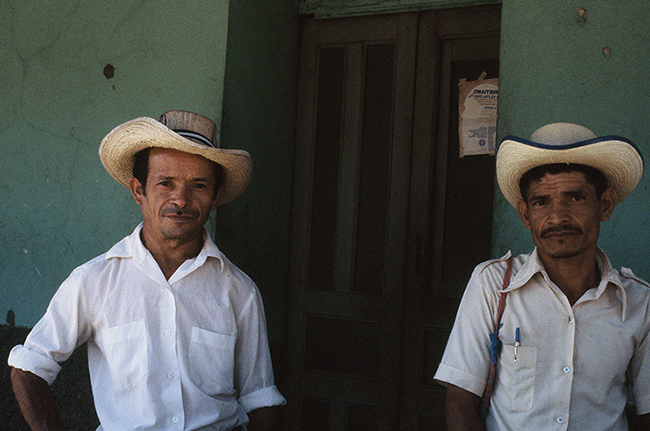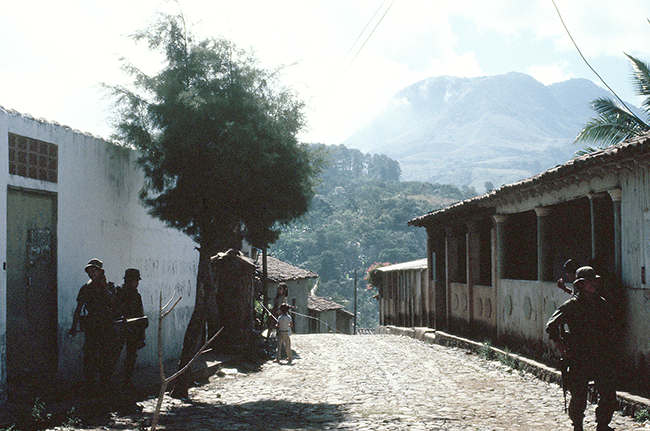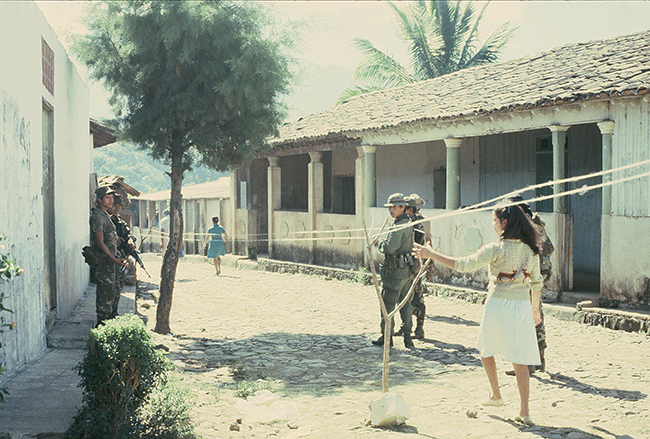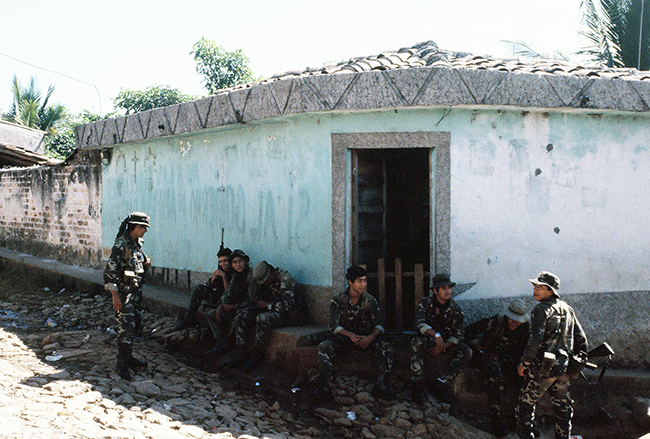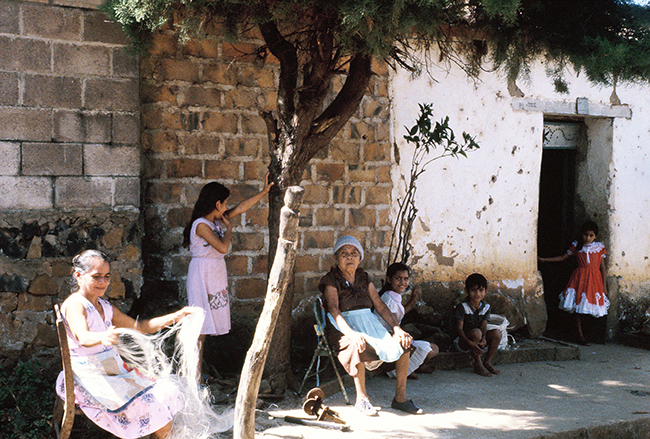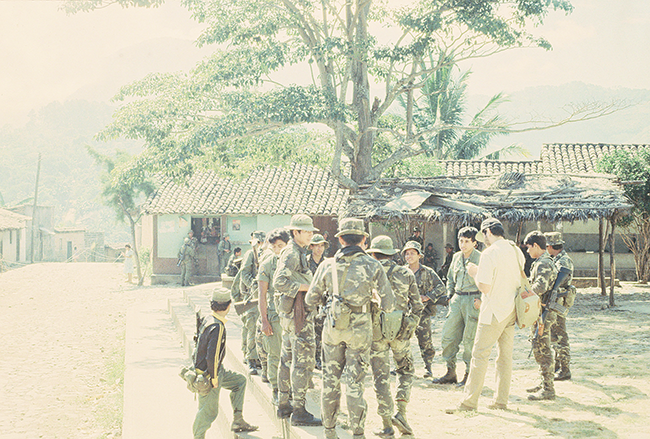Brian’s Lies by Christy George
“A teenaged soldier pointed his rifle at us just after we passed a steaming volcano”
Some thoughts on reporting in a war zone, and the war zone of contemporary news reporting, by a journalist who has engaged with both...
+ + +
That night in 1985, before my friend John and I drove to see the guerrillas, I wrote my mother a letter. Just in case.
“I know you worried about me coming to a war zone, but I needed to see what war was like, to feel like a citizen of the world. Thank you for understanding. I love you.”
I was a statehouse reporter in Boston when I dropped into Central America for just one month, to see Guatemala’s first free election since the US-backed coup in 1954, and to visit Nicaragua and El Salvador, where John wanted to get a little bang-bang.
That’s what all the real foreign correspondents do: get a little bang-bang.
All three countries had a different sort of war in progress. In Guatemala, the military had been waging war against what it saw as guerrillas – a loosely defined group of state enemies that included everyone from labor union activists to college students. In Nicaragua, the U.S.-backed Contras were just over the border and poised to enter the country, which they did the month after I left. And in El Salvador, the United States was actively providing air cover to the repressive right-wing government.
Every morning in San Salvador, I sat poolside and ate my delicious breakfast of huevos rancheros, bacon, black beans, sweet-fried plantains and a wedge of white queso, and overhead, the constant flick-flick-flick of American helicopters. It was as close as I ever got to Vietnam. That's what Central America was for my generation of journalists. The Vietnam we missed.
The morning we went to see the guerrillas, we rented a white Chevy station wagon from San Salvador Hertz, gassed up and got Carlos, our fixer for the day. Carlos said everybody went to La Laguna when they wanted to talk to the guerrillas. We paid him $100, upfront.
A teenaged soldier pointed his rifle at us just after we passed a steaming volcano – maybe even the same volcano where death squads in white Broncos with blackened window glass dropped off the day’s bodies. We showed the kid soldier our letters from the Army, granting us passage into Zonas Conflictiva. The kid rifled through them, but it was clear he couldn’t read. And he was nervous. Carlos spoke fast, angry Spanish until the kid let us go.
We hit another checkpoint near an Army base. And another at the Rio Lempa, where years later, hundreds of bodies washed up. The last checkpoint was just a hut right where the road narrowed and became jungle.
Carlos told John to honk, and we waited, but nobody came out.
Good,” said Carlos. “Sometimes they stop you here, and then you’ve wasted the whole day.”
Carlos told John to drive about a mile and pull over. That’s when we put the white flag on the rear view mirror and used the masking tape to spell out “¡Periodista. No dispare!” on the front and rear windshields.
Carlos cranked up the radio, and Cyndi Lauper blasted.
“I come home in the morning light
My mother says when you gonna live your life right
Oh mother dear we're not the fortunate ones
And girls they want to have fun
Oh girls just want to have fun”
John took that jungle road at 60mph up the mountain all the way to El Paraiso. The road curves as you come into town, which is why we didn’t see the soldiers until we were almost in the main square.
“Uh oh,” said Carlos. “Bang bang.”
The commander smiled when he saw our “Journalist. Don’t shoot!” tape, and led us over to the town well. His men had arranged homemade mines all around the rim. Carlos translated as the commander recounted how his men had captured the mines in a firefight just that morning – a successful operation that was an example of the new, improved army of El Salvador. Before, they would drive loudly into town in jeeps and trucks, and the guerrillas would scatter. But last night, they had crept in on foot in the darkness, and attacked at first light. And for the first time, the Army had taken La Laguna.
Just in time for our visit.
The commander gestured for us to take pictures of the soldiers grouped around the well, smiling and pointing to the mines. We didn’t tell the commander we’d come to see the guerrillas.
Carlos said we could look around town a bit. On every street were women and children in pairs, each holding one end of a long strand of thread. Making string, Carlos said, a La Laguna cottage industry. The women with string wouldn’t talk to me at all.
There was a smell of stew and woodsmoke, and something else burning. On the far side of town, I passed a rocket launcher and a slagheap of smoking metal. The air was filled with crying babies and squawking chickens. Then, in the distance, we heard pops.
“Those are snipers,” Carlos said. “Too close.”
We walked back to the center of town. I was interviewing one old man in my halting Spanish when suddenly, for no apparent reason, Carlos said “Time to go.”
I hesitated.
“Right now.”
+ + +
Parachuting into three hot spots for a month is hardly a career as a foreign correspondent, but it’s long enough to know how hard it is to get the story. I didn’t know the terrain, or the culture, and I’d acquired my Spanish in junior high. All my questions went through translation, and so did all the answers. That leaves a lot of room for error.
Then there’s motive. The people I interviewed had axes to grind, but I didn’t know what they were. Not like I did when I covered the statehouse. Everybody’s got an agenda when they talk to a reporter. Everyone tries to spin you. But in Central America, they could've told me outright lies, and I wouldn’t have had a clue.
And I was just there for a little while: Nicaragua for a few days, El Salvador for a week, and Guatemala for a little more than two weeks. Every place I went was isolated from the rest of the country, especially in Guatemala, a country where people spoke 55 different languages. Not dialects – actual distinct languages, evolved that way because villages are separated by steep mountains.
And then there’s memory. Unless you’re recording everything, every minute, you’ll end up reconstructing some of what you heard and saw. And memory dulls even over a few hours. Just ask a prosecuting attorney whose case depends on the worst possible evidence: an eyewitness account.
In a war zone, all any journalist sees are parts of the story. Trying to extrapolate the whole story based on a few parts is a fool’s errand. But that’s the job we are given.
I try to get it right. I try my damnedest, because I live and die professionally by the words I write, whether they're printed or spoken. As a journalist, my ability to work depends on my reputation. And in Central America, I was acutely aware of my tenuous grasp on truth.
Maybe this is why I feel such sympathy for Brian Williams.
I’ve always liked him. Maybe it’s because the first time I paid attention to him was two days after MSNBC first went on the air. At the time, I was editing national news at The Boston Herald – the mighty Boston Globe's rival daily. The Herald had a newsroom and skeleton staff straight out of His Girl Friday. There was a TV above my funky battered desk, which normally nobody watched because this was a newspaper, damnit.
How I remember July 15, 1996 is that my TV was broadcasting in black and white. It’s highly unlikely, but given the state of the Herald newsroom, not impossible. But there’s memory for you.
First we got a wire service bulletin – plane crash in Long Island Sound. Then I turned up the sound on the TV and channel-switched: nothing on CNN, nothing on the locals, nothing until I hit pictures of the dark ocean off New York, dotted with flames in the water, and the lights of small boats, looking for survivors of TWA 800. Brian Williams was anchoring, and for eight interminable minutes, the upstart MSNBC scooped the venerable CNN. I never turned the channel back to CNN that night. Williams was superb.
Or maybe I liked Williams because he was so game to venture outside his news persona – like the time he played a hunky firefighter on the fake SNL chat show “Bronx Beat.” Or the times he appeared on 30 Rock, as a wannabe comedian crashing the show’s auditions; in his dressing room taking sex calls meant for Tracy Morgan; and gossiping with Andrea Mitchell about Liz Lemon’s latest love affair. Or when he slow-jammed the news with Jimmy Fallon, or regaled David Letterman with insights about his foreign reporting.
I've watched a lot of video clips of Brian Williams lately, because in his January 30th, 2015 newscast on his own show, NBC Nightly News, Brian Williams jumped the shark from journalism to fiction. In a story about Iraq War veterans, Williams said, “The story actually started with a terrible moment a dozen years ago, back during the invasion of Iraq, when the helicopter we were traveling in was forced down after being hit by an RPG.”
That sentence prompted some of the Iraq vets in Williams' 2003 chopper convoy to complain that Williams got it wrong, both on Facebook, and to the military newspaper, Stars and Stripes. Five days later, Williams apologized on the air. A few days after that, he was suspended for six months. And he may never get his anchor chair back.
The problem: Williams changed one critical detail from his original 2003 story in which he reported that his chopper might have been hit by gunfire, to saying in 2015 that it was hit by a rocket propelled grenade.
I’ve screened a lot of tape, read transcripts of Williams' retelling of the story over the years, and listened to what the Iraq veterans say they recall from that day in 2003. And I still don't know what the hell happened.
I tend to trust best the original reporting, when memories were the most fresh. Here's what Williams reported in his original March 26, 2003 news story: “The Chinook ahead of us was almost blown out of the sky.”
That story showed pictures of bullet holes and one big gash -- perhaps by a rocket-propelled grenade -- in what looked like the skin of an aircraft. Pictures don’t tell everything. That gash could’ve been in the lead helicopter, or the one Brian Williams was in, or a different helicopter altogether. Or it could’ve been a gash in a plane. It could even have been file tape from another day, in another country. Still, television journalism ethics would've dictated that the pictures were real, that they showed damage on that day to an aircraft in Williams' convoy.
Over the next decade-plus, Williams told slightly different versions of the incident which, in retrospect, look like an evolving narrative. Notably, he told Dave Letterman in 2013: “Two of our four helicopters were hit by ground fire, including the one I was in, by RPG and AK47.”
There’s no script on a talk show. It’s not journalism. It’s a place to swap stories. Maybe in his head, when Brian Williams said, “including the one I was in,“ he placed commas between “Two of our four helicopters were hit by ground fire” and “by RPG and AK47” to distinguish what happened to his chopper from the lead helicopter. But you can't hear commas on television.
Memories have certainly grown hazy about the events of that day in 2003. The key eyewitnesses -- the Iraq veterans -- offer as many versions of the story as Brian Williams has.
One vet said Williams wasn't even there at all.
Then-Lt. Col. Jerry Pearman told Stars and Stripes: “I can say with 100 percent certainty that no NBC reporters were on any of the aircraft.”
Veterans interviewed by Stars and Stripes and in subsequent news coverage only agreed on one thing: Williams wasn't in the lead chopper, which took RPG fire.
Lead Chinook pilot Don Helus told CNN: “We had a lot going on, but I am pretty sure he was not on our flight at all.”
Flight Engineer Lance Reynolds, who was on the chopper hit by the RPG, led the charge on Facebook: “Sorry dude. I don’t remember you being on my aircraft. I do remember you walking up about an hour after we had landed to ask me what had happened.”
And Sgt. First Class Joseph Miller was in the helicopter with Brian Williams. “We came in behind you [the lead helicopter] about 30-45 minutes later. He is a total POS.”
But Brian Williams never claimed to have been in the lead helicopter. The only issue is whether his chopper took RPG fire.
And some vets backed him up.
The pilot of the Chinook Williams was on, Chief Allan Kelly, confirmed Williams was on his helicopter and explained why it took them so long to catch up with the Chinook that was hit by an RPG: because they finished their mission of dropping bridge parts by the Euphrates River before rejoining the convoy.
Another key witness in Williams’ defense, Rich Krell, Chief Warrant Officer 4, US Army (Ret), was also in Williams' chopper. Krell told CNN that Williams could easily have mistaken the RPG attack on the lead helicopter for small arms fire on their chopper.
“He was there at the time of the attack,” Krell said. “He would’ve been aware of it because of the activity of the crew. The door gunners were returning fire. M-60’s are very loud. The pinging of the bullets hitting us. There were only a few but it’s a very distinct sound, so whether he heard it or not, he was aware something was going on.”
Krell has since backed away, saying his memory might be bad.
Unfortunately, there's no record of what the veterans thought at the time.
"Though the chopper pilots were too shaken to let us interview them, we learned they were shot at,” Williams said in his 2003 story.
The whole event had to be confusing. Emotions must've been running high: fear, anger and the exhilaration of surviving. Perhaps some soldiers resented a network reporter with perfectly coiffed hair parachuting into a war zone for a few days. And as CNN’s Jake Tapper pointed out, it’s so loud inside a helicopter, there’s no way Williams could have known exactly what was happening outside. Neither could the chopper crews themselves.
One thing is very clear: the worst fire Brian Williams took was from the troops.
+ + +
Good journalism is good storytelling. Of course we do our best to tell the truth, but we also emphasize conflict and drama. We choose the most exciting elements of any story to make it memorable. We seek out superlatives, like 'the recent blizzard in New England is the worst in recorded history' (it was), or 'Hurricane Katrina was the worst ever' (it wasn't). We pick our words carefully. We parse and we hedge. That phrase "in recorded history" is a hedge because it's likely there were worse storms before we started measuring.
Now NBC – and media reporters, too, no doubt – are combing through every story Brian Williams has ever reported, and another questionable claim has emerged: did he really see bodies floating by his hotel window during Katrina? What Williams said, on CNBC’s Conversation with Michael Eisner, was: “When you look out your hotel room window in the French Quarter and watch a man float by facedown…”
Critics point out that the French Quarter was spared the worst flooding during Katrina. So maybe Williams was being sloppy and conflating the bodies he’d seen that day and the view out his hotel room in the Ritz-Carlton. Still, the water in the French Quarter was waist-high -- high enough, perhaps, to float a body.
A photographer for the Associated Press has already come forward to say he saw a body on Canal Street, not far from where Williams was staying.
But take a look at that journalistic “you." In broadcasting, "you" often stands in for the royal “we.” So when Williams said, “When you look out your hotel room window…", maybe what he really meant by "you" was someone on his camera crew, or another reporter he talked to in the bar that night, or “all of us covering the story," or "everyone in New Orleans after Katrina,” or even "you, if you'd been there."
To be really fair, look at the context. Williams' entire sentence reads: “When you look out your hotel room window in the French Quarter and watch a man float by facedown, when you see bodies that you last saw in Banda Aceh in Indonesia and swore to yourself you would never see in your country...” Brian Williams certainly didn't mean he saw the same person's body in both Indonesia and New Orleans.
It was a conversational way of talking. On yet another talk show.
Does precision matter? Well, yes, it really does -- or at least it did in the old world of ethical journalism I started out in decades ago. But it’s not clear that ethics matter in a time when aggregators rip off your story, delete your byline, and run it on their site. Without cutting you a check. Hell, even without attribution.
Good anchoring, at least as it’s measured these days, seems to include putting yourself at the center of the story, whether it’s being embedded with troops at the start of the second Bush’s Iraq War, or on the network blog, or the network’s comedy shows, or even on rival network’s talk shows. Be human. Be yourself. And make it dramatic.
Everybody does it these days, not just network anchors, but public radio hosts and even newspaper reporters. It’s dangerous to try to be both likable and a trusted news person. The more we become celebrities, the more we risk our integrity. Even posting on social media is fraught with peril, because serious news people aren’t allowed to have opinions. But try to find a newsroom in America these days where journalists aren’t required to use social media.
Nobody did it all better than Brian Williams. And he had the ratings to prove it – top of the heap on network news, with millions more viewers than any cable news channel. He was still the most-watched news anchor in America the week before he was suspended for six months without pay. Number one even after the story broke.
There’s something about this whole affair that really pisses me off, and it’s this: the reporters, and columnists, and commentators who can’t stop trashing Brian Williams did so without doing any real reporting. They just piled on because that’s what happens in a media frenzy. People spout opinions. People pontificate and bloviate.
Remember what Brian Williams reported as the Iraq War began? “The Chinook ahead of us was almost blown out of the sky.” Turns out NBC’s online archived version of that story bears this headline: “Target Iraq: Helicopter NBC’s Brian Williams Was Riding In Comes Under Fire.” That’s not Williams – that’s the National Broadcasting Company.
Maybe, over time, Williams honestly came to believe his Chinook was shot at by an RPG. Just like some of the soldiers that day now believe NBC wasn’t there at all.
If Brian Williams turns out to be a deliberate serial liar at the end of his time-out in anchor purgatory, I'll gladly grab a pitchfork. But if this were a news story my fellow journalists were actually covering, I'm pretty sure they wouldn't be so quick to pronounce him guilty.
Because the stories about Brian Williams aren’t sourced any better than his was.
Brian Williams' journey from America's anchorman into news industry pariah should've changed celebrity journalism. And maybe it has, a little. Williams and Lester Holt, NBC's temporary replacement in the Nightly News anchor chair, performed a hip-hop number together on The Tonight Show in 2014. Since he took over for Williams, Lester Holt hasn't been on any talk shows. Except -- in March, Holt did participate in a fun toss to the Nightly News from the anchorman of Chicago's NBC affiliate, WMAQ -- his son, Stefan Holt.
+ + +
On the way back down the mountain from La Laguna, it was Madonna on the radio.
“Living in a material world. And I’m a material girl.”
This time, there were four guards at the checkpoint. They pulled us over, and motioned us out of our car with their guns.
“Periodistas,” we said, but they took our passports and shut us in a small room. Carlos listened through the walls. He said the soldiers were afraid they might get in trouble for letting us past the checkpoint right after a firefight.
We sat there for 45 minutes, sweating. And then they let us go.
Two days later, we went back into the mountains.
In a cab.
Without Carlos.
+ + +
If you enjoyed reading this piece, you might also like "The Heart of the Boston Marathon," by Brian S. Ellis, here.
+ + +
Christy George is a writer and independent producer for public radio & public TV. She's guilt-ridden about her carbon footprint, but her reporting on politics, business and the environment won her three Emmys, a Gracie, an Edward R. Murrow, a New York Festivals and a 1/39th share in Marketplace Radio’s Columbia DuPont Silver Baton. She’s working on two books in Tom Spanbauer’s Dangerous Writing workshop, one fiction, and one non fiction.


